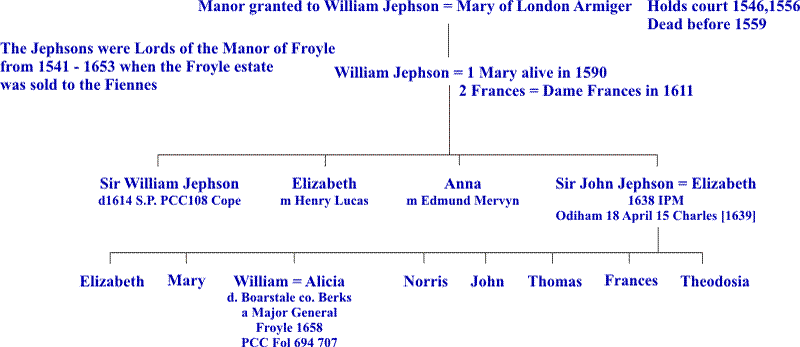The Jephsons

Sir John Jephson of Froyle Co. Hants, and of Mallow Co. Cork, in right of his wife, on the death of his elder brother Sir William in 1614 (Henry VIII had granted the Manor of Froyle to their grand-father William Jephson in 1541) Privy Councillor Ireland, knighted by L. D. Sir George Carey, 18 December 1603, knight of the shire Rants. 1620, M.P. Petersfield 1623 and 1625, Major-General in the army; d. 16 May1638; will proved PCC 1638, Inquisition Post Mortem taken at Odi(h)am 18 April, 15 Charles I, 1639; m. 1st Elizabeth daughter of Sir Thomas Norreys (youngest son of Henry, Baron Norreys, of Rycote, and uncle of Francis, Earl of Berkshire). Lord president of Munster and justice of Ireland. He m. secondly Mary, daughter and heir of Sir Henry Duke, Knt. of Castle Jordan, Co Meath, and relict of Sir Francis Ruish and Richard Gifford Esq. By his first wife he had three sons and 4 daughters q.v. above.
| 1) | William, Major-General in the army, envoy to Sweden 1657, M.P.Stockbridge, member of Hants. Cttee. 1644, Lt. Gov. of Portsmouth in 1644 sold the Froyle estate in 1653 m. Alicia, daughter of Sir John Denham from him descends Sir Charles Denham Orlando Jephson-Norreys, created a Baronet 6 August 1838. |
| 2) | Norreys, Colonel in the army, m. Eleanor, daughter of Sir Henry Colley, of Castle Carbery (D. Wellington), and had a son, Norreys. She re-married to …………. Pitts. |
| 3) | John, Colonel in the army, m. first Bridget daughter of Most Rev. Richard Boyle D.D. archbishop of Tuam (E. Cork). He m. secondly, Phillipa, daughter of Sir Henry Neville, of Billingbere (B. Braybrooke). By his first wife he had three sons and three daughters. |
Jephson Arms, (as given in the Visitation of Hants., 1577) – Er m, three bugle horns sa; but Sir John Jephson registered Ar, on a chevron, sa, a sun in full glory, between three lions heads, gu, bezanté. Since the Protectorate, the family has used the arms of Jesson, viz, az, a fesse embattled or, between three cocks heads, wattled ppr.

Arms (Lucas of Suffolk). Ar, two lions rampant, combatant gu
}
All my estates in Counties of Sussex and Southampton to my wife Anna (née Jephson), to bring up my children now unmarried, and pay them marrige portions. To my son and heir Henry Mervyn, all said estates at death of my wife. Residue to wife, to be my executrix. Proved in London 20 February 1604-5.
}
Residue to my said brother Sir John Jephson, and my son Peter Bettesworth, and make them executors. Proved in London, 3 July 1628.
Arms (Mervyn, Durford;and Petersfield, Co. Rants.) Sa, three lions pass. ar.
At Froyle Sir John Jephson was the most influential and noteworthy in his impact on the manor the Jacobean Froyle Place was built to his requirements and 18th century prints of the main elevations show little change except that stone mullioned windows with leaded lights have been superceded by sash windows. His forceful politics supporting Oliver Cromwell also had a great effect on the local community. Sir John’s political views were shared by the Jervoises of Herriards and Clarendon comments as follows “William Jephson Esq., M.P. for Stockbridge, son of Sir John Jephson of Froyle and captain Jervoise of Herriards, the two eldest sons of the greatest rebels of that county, both heirs to good fortunes. Both became heavily involved “in Basing Church were captured and sent into the House young captain Jervoise and captain John Jephson whom Gage calls sons of the two most active rebels of that County”. These two officers are said to have been “both kinsman to Colonel Norton”.
In order still further to conceal his retreat Colonel Gage had given orders that the next morning a letter should be sent to Colonel Norton offering to exchange Captain Jephson for captain Love, which was accordingly done. The exchange was effected by noon, and the enemy later discovered too late that the relieving force was beyond their reach. Captain Love’s family resided at Basing. As we here see he was a Royalist but his relation Nicholas Love was a member of the Committee of Parliament for Hants. Verily, houses were divided in those days. Captain Jephson afterwards changed sides and was Governor for the King at Bandon-bridge in Ireland. (1643/4) William Jephson, member of the Hampshire Committee.
In a list of “Persons not thought meet to be recommended, though they much desire it, and are of such poor pronciples and so unfit to make leaders of that they would not have been set with the dogs of the flock, as Job speaks in another case (Job XXX-I) of the Army and others who pretended to be honest had kept close to their former good and honest principles”, mention is made of “Colonel Jephson, a man of better principles than the former, but for his good service in voting for a King (Cromwell), is lately sent Ambassador to Sweden.”